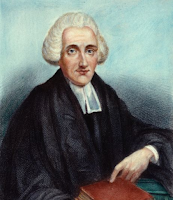 |
| Augustus Montague Toplady (1740-1778) |
Because of his early connection to Methodism, it was only natural that the young Toplady originally agreed with Wesley's theology, which is called Arminianism. This school of thought was named after James Arminius (a latinized version of the Dutch name Jakob Hermanszoon), who around the year 1600 began espousing certain teachings that were contrary to the prevailing Calvinism in the Netherlands—namely, that the doctrine of election was misunderstood, and that humans do play a rôle in their own salvation.
What is often forgotten, misunderstood, or denied these days is that Anglicanism in earlier times was quite Calvinist in its understanding of Christianity. For example the 39 Articles of Religion, still officially espoused by the Church of England, state (in Article XVII) that
Predestination to Life is the everlasting purpose of God, whereby (before the foundations of the world were laid) he hath constantly decreed by his counsel secret to us, to deliver from curse and damnation those whom he hath chosen in Christ out of mankind, and to bring them by Christ to everlasting salvation...Wesley was therefore considered a heretic by many in his own church because of his strong belief in free will. He once asked, "How is it more for the glory of God to save man irresistibly, than to save him as a free agent, by such grace as he may either concur or resist?” He is basically here stating that we have the power to say No to God—something that Calvin and the Reformed branch of Protestantism would deny.
As a teenager, then, Augustus Toplady considered himself, like John Wesley, an Arminian. But at the age of 18, he was influenced by theologians such as Thomas Manton, as well as by the 39 Articles themselves, to reject Arminianism and embrace the orthodox Calvinist views of the 18th-century Anglican mainstream.
Toplady attended Trinity College in Dublin and was ordained a deacon in the Church of England in 1762. A year before his 1764 ordination as a priest, he published the poem for which he is best known: Rock of Ages, Cleft for Me. Here are the original words:
Rock of Ages, cleft for me,We see Toplady's embrace of Calvinism throughout this hymn, but most markedly in the second stanza. The rejection of works is obvious. But his rejection of revivalism is also noteworthy here, eschewing dependence on one's emotional response to the gospel in order to ensure salvation.
let me hide myself in thee;
let the water and the blood,
from thy riven side which flowed,
be of sin the double cure,
cleanse me from its guilt and power.
Not the labour of my hands
can fulfill thy law's demands;
could my zeal no respite know,
could my tears forever flow,
all for sin could not atone;
thou must save, and thou alone.
Nothing in my hand I bring,
simply to thy cross I cling;
naked, come to thee for dress;
helpless, look to thee for grace;
foul, I to the fountain fly;
wash me, Saviour, or I die!
While I draw this fleeting breath,
when mine eyes shall close in death,
when I soar to worlds unknown,
see thee on thy judgement throne,
Rock of Ages, cleft for me,
let me hide myself in thee.
 |
| John Greenleaf Whittier (2807-1892) |
And yet the past comes round again,If Toplady's rejection of revivalism led him to also reject the free will and write a poem about election, it's interesting that Whittier's similar rejection led him to write a poem about serenity. And just as Rock of Ages is one of the most popular hymns among English-speaking Christians, so is Whittier's. If you wonder how that could be, since you've probably never sung a hymn about the brewing of a psychodelic drink, take a look at verses 12-17 of Whittier's poem:
and new doth old fulfill;
in sensual transports wild as vain
we brew in many a Christian fane
the heathen Soma still!
Dear Lord and Father of mankind,Isn't it amazing how the same impulse can lead in two very different directions, and yet the results of both are equally beautiful and equally treasured? It sort of shows how the church could be if we could only bring ourselves to love one another as Christ intended.
forgive our foolish ways!
Reclothe us in our rightful mind,
in purer lives thy service find,
in deeper reverence, praise.
In simple trust like theirs who heard
beside the Syrian sea
the gracious calling of the Lord,
let us, like them, without a word
rise up and follow thee.
O Sabbath rest by Galilee!
O calm of hills above,
where Jesus knelt to share with thee
the silence of eternity
interpreted by love!
With that deep hush subduing all
our words and works that drown
the tender whisper of thy call,
and noiseless let thy blessing fall
as fell thy manna down.
Drop thy still dews of quietness,
till all our strivings cease;
take from our souls the strain and stress,
and let our ordered lives confess
thy beauty of thy peace.
Breathe through the hearts of our desire
thy coolness and thy balm;
let sense be numb, let flesh retire;
speak through the earthquake, wind, and fire,
O still, small voice of calm!
Tune: Toplady Tune: Rest Tune: Repton
